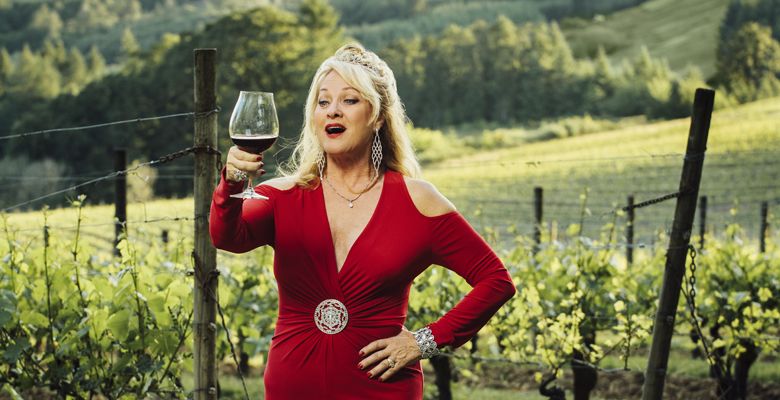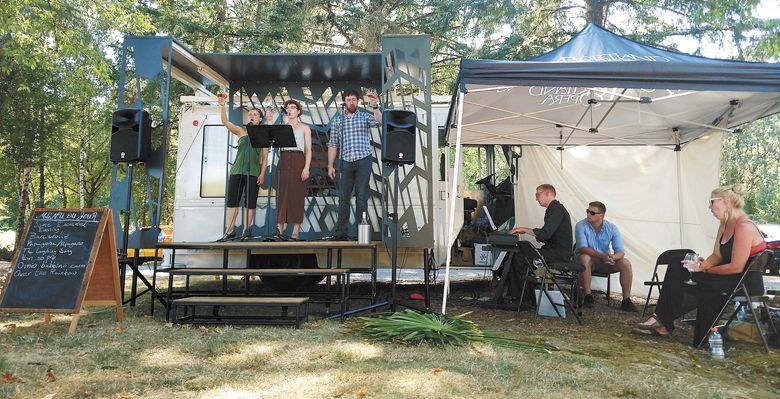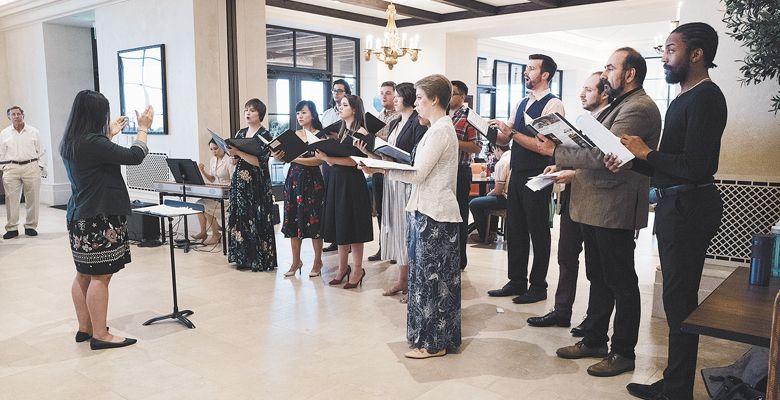Opera & Wine
A classic, dramatic duet
Wine stimulates our sense of smell, taste and touch. Opera engages our hearing and sight. Each intoxicates in its own way. Combine them, and you have a full sensory experience. Oregon wine country has become a stellar place to sip while listening to some of the greatest vocal music ever written. The area remains home to opera singers and enthusiasts with strong connections to the wine industry, not to mention the Aquilon Music Festival at Linfield College in
McMinnville, hosting singers in several venues, including vineyards and wineries.
Opera’s Beginnings
While wine was made several thousand years earlier, the first known roots of opera date to Greece, where Thespis — the etymology of thespian — was the first person to portray a character, as opposed to speaking as himself, on stage. His performances included songs termed “dithyrambs” honoring Dionysus, the Greek god of wine. Thespis was also the first to perform a new style called “tragedy,” during which he portrayed several characters with the aid of masks. In 534 BC, he won a contest for the best tragedy during Dionysia, a festival to honor the deity.
Jacopo Peri wrote the earliest opera, “Dafne,” — now lost — for the Florentine Camerata, a group interested in reviving Greek drama; members performed the piece in Florence, Italy, in 1598. The opera told the story of Daphne, a nymph pursued by the god Apollo, the brother of Dionysus. Some 400 years later, “Opera composers use wine references a lot,” notes Chelsea Janzen, public relations coordinator for Aquilon and office coordinator for Linfield’s Evenstad Center for Wine Education, among other titles. Additionally, she explains how the Italian word for toast, brindisi, is also the term used for a drinking song in opera.
Opera in Oregon
Salem’s Reed Opera House, established in 1870 by Cyrus Reed, was originally built to house various branches of the new state’s government, but the incoming administration reneged. Instead, shops opened on the street level; the opera house, a theater with 1,500 seats, existed on the second and third floors; and a hotel occupied the rest. In 19th century America, “opera house” was considered a more respectable designation than “theater.” And yet, the venue hosted opera companies, among other shows, meetings and exhibits. The building, located at 189 Liberty St. N.E., currently houses shops, eating and drinking establishments, offices, the Reed Opera House Ballroom and the Verona Studio at Cyrus Reed Theatre.
Other opera houses opened in Oregon around the turn of the last century. The Houston Opera House, established in Klamath Falls in 1897, became the town’s venue for various events, until it burned down in 1920. The Baker City Opera House, constructed around the same time, also succumbed to fire, in 1937. The Elgin Opera House, dedicated in 1912 in the town of the same name, currently houses the oldest operating movie theater in Oregon, and hosts live shows and readings.
Almost 300 miles due east, the Portland Opera Association organized in 1964 and has been flourishing since. Now known simply as Portland Opera, it stages about six productions each season in Keller Auditorium and Newmark Theatre. Portland Opera To Go travels around Oregon and southwest Washington, introducing students to the art form.
Part of Portland’s to-go experience has morphed into Opera a la Cart, one of the most pleasurable wine experiences in the Willamette Valley. Guests listen to arias sung by serious talent on a small stage in front of a converted box truck — think food cart — parked near wineries and often surrounded by vines.
Winemaker Remy Drabkin became an “al a cart” regular after inviting the group to her 10th-anniversary celebration in 2016. It was so successful, she has hosted the singers at her tasting room in Dayton every year since.
Additional opera companies include the Rogue Opera, founded in 1976, in Medford; its shows grace the main stage inside the Craterian Theater at The Collier Center for the Performing Arts. Eugene Opera, established in 1977, performs as one of the resident companies in the Hult Center for the Performing Arts. Like Portland, Rogue and Eugene operas bring its art into community schools.
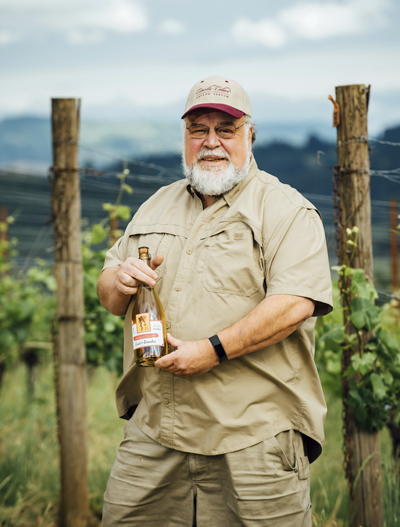
Local Talent
Several operagoers and performers with Oregon wine connections live in the Willamette Valley; Drabkin counts herself among them — at least the former. “I grew up with the occasional opera spinning on the record player and developed a love of arias hanging around kitchens, wine people and Italians,” she recalls. “I connected with the Portland Opera when I wanted to take a woman I was dating (now my wife) to its Big Night celebration. I called and asked if I could trade wine for tickets; I’ve been an annual sponsor ever since. This year, [Remy Wines] was the wine sponsor for ‘The Barber of Seville.’”
Julliard-trained soprano Nancy Emrick has sung around the U.S. and Europe. She’s performed eight main-stage roles with Portland Opera at Keller Auditorium, including Zerlina in Mozart’s “Don Giovanni,” Frasquita in Bizet’s “Carmen” and Poussette in Massenet’s “Manon.” From 2002 to 2013, she sang at Teatro ZinZanni in Seattle, starring as La Diva. More recently, she’s performed at fundraisers for Aquilon, on which board she sits. Emrick and her husband, Robert, own the KAOS building on Third Street in McMinnville. The three-story building houses The Barberry, 1882 Grille and the Oregon Wine Village, which focuses on local wines, including many boutique labels. Emrick occasionally hosts “Opera at The Barberry,” a multicourse celebration of food, wine and song.
Ken Cancilla started singing in high school musicals; then, he became a keyboardist and part of a rock band in college. In his 30s, while living in Washington, D.C., he took voice lessons from a coach who encouraged him to audition for “Carmen” in 1995. He landed the role of Lillas Pastia, a tavern owner. A bass-baritone, Cancilla describes himself as a character actor who “actually had a pretty good reputation with the local opera companies.” This led to a role that summer in “Don Giovanni” at Wolf Trap National Park for the Performing Arts in Vienna, Virginia, outside D.C. Accepting a job offer, he moved to Oregon in early 1996. He performed in a couple shows with Portland Opera, including “Don Giovanni” and “Aida.”
Before the move west, Cancilla took an interest in wine. But his tastes moved from big reds to Pinot Noir after he tried bottles from Oregon and Burgundy. He knew when he accepted the new position he’d eventually want to plant a vineyard. The first 10 acres of Cancilla Vineyard were established in 1999, followed by another 10 between 2005 and 2006, all certified 100% organic by Oregon Tilth.
When the vines came into production in 2001, he stopped singing because of the demanding rehearsal schedules. Cancilla concedes, “So, I’ve been an active supporter of the opera since then, from the audience.” Most of the grapes are sold to wineries in the Valley, but Chris Berg of Roots Wine Company makes about 300 cases for the Cancilla Cellars label, sold directly to a private mailing list.
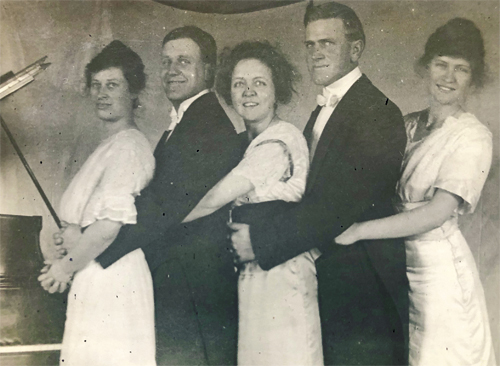
Elk Cove Connection
Puccini’s “La Bohème” concludes with the death of Mimi, one of the principals. On one of their first dates in the late 1950s, Pat and Joe Campbell drove two hours from Hood River to Portland. In a record shop, in the Meier & Frank Building, they listened to “La Bohème.” What Pat remembers most about the trip in Joe’s father’s lavender 1953 Cadillac Coupe, their first ride to Portland together, was “falling madly in love.” In 1974, the Campbells established Elk Cove Vineyards outside Gaston, joining the pioneers of the post-Prohibition Oregon wine industry.
Pat’s maternal grandfather, Raymond Hall, was a professional opera singer who traveled between 1900 and 1910. According to Pat, “They had a lot of small opera companies back then; there weren’t a lot of other options for entertainment.” When he was 26, Hall returned home to Idaho and “got grandma Elva Buela Harmon pregnant. After that, he had to start making a living, so he quit traveling and singing to work as a carpenter.”
Pat’s daughter, Anna, continues the story, “[My parents] bought La Bohème [Vineyard] two to three years after purchasing the main property. It was 24.6 acres of neighboring land that had an old prune orchard on it. The Bohemes — who pronounced their name as BAY-mee — had bought the property with the intention of building a home there, but changed their mind. My mom’s dad, who was an orchardist, encouraged my parents to buy the property when it went up for sale. When they saw the name of the people selling the property, they took it as a sign… They named [the vineyard] after the previous owners and the opera they listened to on their first trip to Portland together.”
Aquilon 2019
The Aquilon Music Festival and Young Artist Opera Program returns July 1–21, for a second year after a remarkably successful launch last summer, which included sold-out performances of two operas and more than 10 winery concerts.
Aquilon is the brainchild of Anton Belov, associate professor of music at Linfield College, who grew tired of traveling to Maine to co-direct a similar festival. Why not just start one here? After all, in the summer, Linfield has the available facilities and is located in the heart of a wine region. He chose the name Aquilon, the Roman god of the North Wind, because of the event’s location in the Northwest and a reference to Aquilon blowing through vineyards in a Russian poem by Alexander Pushkin.
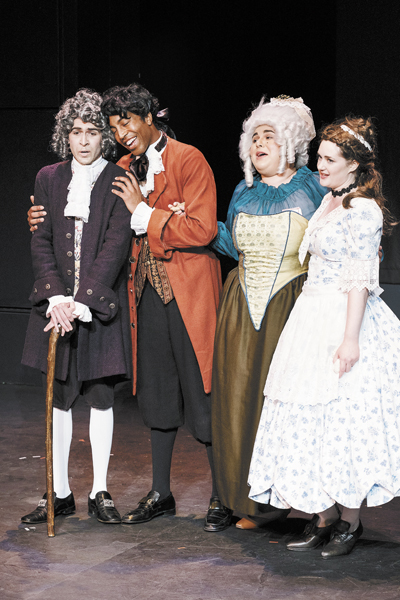
Young artists from around the world are invited to apply. This year, 120 applications were received, 50 were accepted and 35 emerging talents will come — nine for the second time. Those selected will study with a distinguished faculty of 10, which includes internationally renowned baritone Richard Zeller. who also performs around the world. Seven faculty members are back for the second year. The young artists come to advance their craft and to participate in the various events, including a fully staged opera. This year, two casts will alternate performing Mozart’s “The Magic Flute” with a German libretto by Emanuel Schikaneder — in case sie kein Deutsch sprechen, English dialogue will be used and supertitles projected above the stage. The production, conducted by Barbara Day Turner, is staged by veteran director Daniel Helfgot with fantastical stage sets by designer Robert Vaughn. When not occupied by the rehearsals, the festival participants’ long days are filled with private and group instruction, master classes, rehearsals and performances.
Chelsea Janzen, who is assisting Belov, has credentials particularly suited to her role. The soprano has an undergraduate degree in music from Linfield and a Master of Music from Arizona State University, where she sang in several operas. She will create the role of Pamina in one of the casts of “The Magic Flute.” Having grown up in Oregon, she developed an appreciation for wine and remembers having her “first sip of Champagne in the lobby of the Metropolitan Opera” in New York. In addition to her roles in the wine program at Linfield, her résumé also includes tasting room experience.
Admittedly an amateur when it comes to wine, Belov contributes to the wine industry as an enthusiastic consumer and was recently inducted into the Oregon Wine Brotherhood. He also recognizes the strong connection between opera and wine: “Opera is a Mediterranean art form … that arises from Italy and France, the most important winegrowing regions in Europe.”
From intimate vineyard soirées to recitals and a staged opera, Aquilon promise much to enjoy. On June 1, Methven Family Vineyards hosted about 60 people for a Northwest Young Artists Showcase as a preview for the events in July. The Festival Schedule as of this writing is below. Belov and Janzen are seeking other venues for additional events during and after the festival, as encore concerts. Visit aquilonmusicfestival.org for the latest schedule and information about the artists.
Opera & Wine Pairings
As with a multi-course dinner, attempting to pair a single wine with an entire opera may miss the opportunity for more nuanced couplings. Since the word “opera” is the plural of “opus,” the Latin word for work, we collected suggestions for matching wines with arias, which are single servings of song, as well as for entire works.
Remy Drabkin of Remy Wines proposes, “For my aria, I choose ‘The Habanera’ from ‘Carmen’ (Bizet), and my perfect pairing is our 2015 Sangiovese Riserva. For starters, this aria sings of love and Sangiovese, which derives its name from ‘the blood of Jupiter,’ also speaks to that essential life force. Sung by a woman, there is an element of female empowerment in a world that has long been male dominated. As a female-centric winery, that also speaks to me … plus, I love women.”
Drabkin continues, “The delicate notes as it begins, both high and low, [are] similar to this wine when first opened. Then the layering of flavors, the repeating of notes, each sip, each refrain adds complexity. The strength and structure of the aria matches it counterparts in the wine. The changes also remind me of the Riserva —which we develop in barrel over two years — and the fullness of the chorus as the wine hits your mid-palate is perfection.”
Because “Carmen” takes place in Spain, Chelsea Janzen suggests Tempranillo. A number of Oregon wineries produce excellent Tempranillo, including Abacela. Anton Belov also mentions Burgundy as a possible pairing; an Oregon Pinot should also do well.
Ken Cancilla recommends Roots 2016 Estate Vineyard Pinot Noir with Puccini’s “Tosca.” “[This] is a serious opera with some wonderfully extravagant arias, while the Roots Estate Pinot is a wine with some serious depth and complexity, coupled with extravagantly delicious layers of fruit.”
For Rossini’s 1816 comedic masterpiece, Cancilla suggests Timothy Malone 2017 Cancilla Vineyard Chardonnay. “‘The Barber of Seville’ is a fun romp with some of Rossini’s most exuberant melodies. The 2017 Malone Chardonnay is a most enjoyable wine with crisp acidity, mouthwatering tropical fruits and nice minerality on the finish.”
“The Champagne Song” from Strauss’ “Die Fledermaus,” needs no other pairing. “Champagne in ‘Die Fledermaus’ is considered the fault of everything that goes wrong in the opera. Everyone blames all the mistakes and confusion in the opera plot on Champagne, and then the ensemble sings a famous Champagne toast,” Janzen explains. Nancy Emrick, a fan of Argyle Brut and Soter Brut, who sang the role of Adele in the opera with the Columbia Symphony’s annual staging in Portland recalls, “We had lots of fun with the bubbles AFTER the performance.”
Similarly, enjoyment of the Champagne aria in Mozart’s “Don Giovanni” should be enhanced with that beverage in hand. Speaking of Don Giovanni, I propose pairing the Catalogue Aria, which enumerates Don’s conquests, with a 2014 Pinot Noir from the Willamette Valley, a vintage I’ve referred to as a “one-night stand.”
And then there is Wagner. How about a Syrah from The Rocks District of Milton-Freewater while listening to the “Ride of the Valkyries” from “Die Walküre?”


